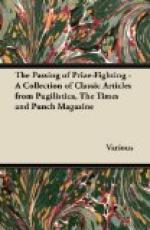* * * * *
If Humphrey Thorncot and his sister Edith had not bored one another and grown touchy—I judge by their reported conversations—in a house with green shutters in Chelsea, they would never have gone to St. Elizabeth, which is a Swiss resort, and would never have met the East-Prussian family of the von Ludwigs in the year before the War. And Humphrey would never have fallen (temporarily) in love with Hulda von Ludwig, nor would Karl von Ludwig have fallen (permanently) in love with Edith Thorncot. The troubles and miseries of this latter couple are related by Mr. HUGH SPENDER in The Gulf (COLLINS). Papa von Ludwig objects so violently to all this love-making that he eventually succumbs to a regular East-Prussian stroke of apoplexy which all but leads to a charge of parricide against Karl by his base brother, Wilhelm. Karl is really too good for this world. He objects to atrocities and refuses at the risk of his own life to shoot innocent Belgian villagers. Being imprisoned, he escapes by means of a secret sliding panel and an underground passage which leads him, not immediately, but after many vicissitudes, to America. There he is joined by his faithful Edith, who defies the Gulf caused by the War, and marries him. Mr. SPENDER appears to have been in some doubt as to whether he should write the story of two souls or the history of the first few weeks of the War. Eventually he elects to do both, and his novel consequently suffers somewhat in grip. He certainly paints a very vivid picture of events in the first period of active operations. May I hint a doubt, by the way, whether in 1913 a French Professor would have mentioned HINDENBURG as one of Germany’s most important men? Whatever he may have been in Germany, HINDENBURG was for the outside world a later discovery.




